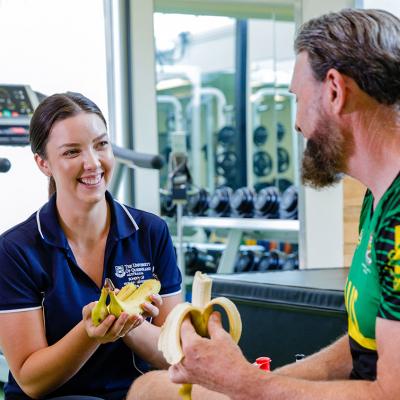Imagine a career where your passion for food and nutrition empowers others to live healthier, happier lives.
As a dietitian, you'll be a health professional specialising in nutrition, working closely with individuals and communities to provide dietary food and nutrition advice, support behaviour change, manage medical conditions, and promote overall wellbeing.
To delve deeper into the role, we spoke with Professor Sarah McNaughton, Discipline Lead for Nutrition and Dietetics at UQ. She shared insights about what dietitians do, where they work, and how you can kickstart an exciting career in this field.
The role of dietitians
Accredited practising dietitians (APDs) are experts in turning detailed nutritional information into everyday guidance that truly makes a difference. They work in diverse settings, from hospitals and community health centres to food services, private practice, food industry, sports nutrition, and research.
"With their expertise, accredited practising dietitians translate complex nutrition science into practical advice, empowering individuals to make informed choices that significantly improve their health," says Sarah.
What does "accredited practising dietitian" mean?
An accredited practising dietitian (APD) is a university-qualified dietitian who has successfully fulfilled the requirements of the Accredited Practising Dietitian program run by the Dietitians Association of Australia (DAA). APDs adhere to strict standards and guidelines to ensure high-quality, evidence-based care. The APD credential is the standard of excellence in dietetics and nutrition here in Australia. This means an accredited practising dietitian is an expert who can help address clients’ health and nutrition concerns.
Whether in clinical settings or public health roles, APDs are trained to deliver a wide range of services such as:
- managing health conditions with tailored nutrition plans
- designing custom meal plans to meet individual needs
- providing expert advice on improving your diet
- conducting assessments to evaluate dietary habits and health
- education on nutrition, healthy eating and food safety
- developing and implementing nutrition policies and programs for communities and populations
- offering consultation and support to individuals and organisations
- conducting research to advance nutrition science and dietetics practice.
What’s the difference between a dietitian and a nutritionist?
Dietitians and nutritionists both aim to enhance health through nutrition, but their roles differ significantly. Dietitians are professionals with formal training and are authorised to provide medical nutrition therapy to individuals and manage health conditions like diabetes and heart disease in collaboration with other healthcare professionals.
Nutritionists, on the other hand, are trained in nutrition science and usually provide advice on healthy eating and wellness to communities and populations rather than managing medical conditions with individuals.
“The simplest way to understand the difference is that dietetics is a specialised field within nutrition studies. Dietitians can work in all the areas that nutritionists do, but with additional qualifications to provide tailored nutrition management and medical nutrition therapy."
Where do dietitians work?
Dietitians have a diverse range of career options with numerous fields and settings in which they can apply their expertise.
“Dietetics is a dynamic profession that is continually evolving," says Sarah.
"As the industry expands, it opens up new and innovative areas of practice, offering fresh and exciting opportunities.”
In clinical environments such as hospitals, dietitians provide medical nutrition therapy and collaborate with healthcare teams to manage various health conditions. In community health, they may offer nutrition advice and preventive care at health centres and non-profits.
In the realm of sports nutrition, dietitians help athletes enhance their performance and recovery. They also play a crucial role in food service management, overseeing food provision and ensuring food safety in schools and hospitals.
Some dietitians operate private practices, providing personalised nutrition advice tailored to individual needs. Others work in corporate wellness, developing programs to promote healthy eating among employees.
“Many of our tech-savvy graduates have found innovative ways to deliver their services through social media," says Sarah.
"They offer one-on-one online consultations and create engaging content for social media, blogs, and podcasts to share their expertise and provide valuable nutrition advice."
Additionally, some dietitians pursue careers in research and academia, advancing nutrition science and dietetic practice through universities and research institutions.
Who do dietitians work with?
Dietitians work with a wide range of people on how food and nutrition affect their health. They can work with:
- individuals to promote and maintain wellbeing
- at-risk populations to prevent illness
- healthcare workers, collaborating with doctors, nurses, and others
- people with medical conditions to manage specific health issues
- student dietitians to mentor and train future professionals
- athletes and trainers to optimise performance and recovery
- food industry professionals, advising on nutrition and food safety.
“Dietitians often work in multidisciplinary teams, combining their expertise with that of other health professionals like doctors, psychologists, exercise physiologists or occupational therapists, to provide comprehensive care, ensuring all aspects of a patient’s health are addressed,” says Sarah.

Why choose a career in dietetics?
“Dietitians thrive on working with people and food, embracing challenges, and making a real difference," says Sarah.
"They find deep satisfaction in improving lives through nutrition.”
The field of dietetics is rich with specialisations and diverse work environments. Whether you're interested in working with different age groups or focusing on niche areas like sports nutrition, clinical settings, or community health, dietetics offers the flexibility to tailor your career to your passions.
“The diversity in dietetics allows you to explore various specialisations and shape your career path according to your interests,” says Sarah.
Dietitians play a crucial role in public health, which translates to high demand for their expertise and a wealth of job opportunities. The profession offers a solid work-life balance, room for advancement, and an average salary of $95k in Australia.
According to Sarah, the growing need for dietitians ensures ample opportunities and high career satisfaction.
“With the ability to impact lives positively and a variety of career paths to choose from, dietetics is a rewarding and fulfilling career choice.”
How to become a dietitian in Australia
To become an accredited practising dietitian (APD) in Australia, you need to:
- hold a degree accredited by Dietitians Australia
- join the Dietitians Australia APD program
- become a member of Dietitians Australia.
Learn more about becoming a dietitian
Ready to begin or advance your career in nutrition and dietetics? Explore UQ's programs in this field.
Undergraduate/postgraduate vertical dual program:
Undergraduate programs with pathways into postgraduate study:
- Bachelor of Human Movement and Nutrition Sciences
- Bachelor of Human Movement and Nutrition Sciences / Bachelor of Science (Food Science and Nutrition major)
- Bachelor of Health Sciences
Postgraduate program:









